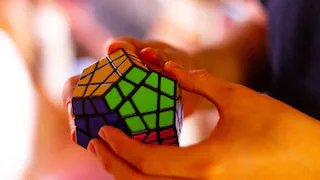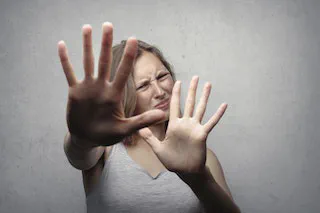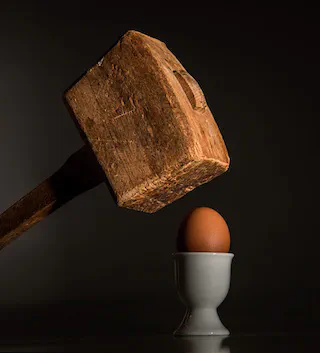
The age of Cognitive Dissonance & Conspiracy Theories
- Matthieu P.J.
- Personal development
- January 7, 2021
Cognitive dissonance, confirmation bias, conspiracy theories… an explosive cocktail for this article. Let’s get down the rabbit hole together!
Table of Contents
What is cognitive dissonance?
DEFINITION:
‘Psychological conflict resulting from incongruous beliefs and attitudes held simultaneously’
[Source: Webster]‘In the field of psychology, Cognitive Dissonance occurs when a person holds contradictory beliefs, ideas, or values, and is typically experienced as psychological stress when they participate in an action that goes against one or more of them.’
[Source: Wikipedia]
There is an invisible war going on in our heads, all the time. Our ego, the lower mind, is constantly trying to reassure itself by building a version of the world that is consistent and makes sense to it. It’s a self-preservation mechanism. Over the course of our life, we take in information from various sources: first our parents, then our teachers at school, later the politicians we see on TV, some figures of power, some artists and celebrities etc. Most of us have accepted blindly what the previous generation passed on, and took it for granted. It is the framework in which we have grown up. For many of us, it is our sense of identity. The truth is: we are the by-product of the beliefs we’ve held all our life.
So what happens on a daily basis to all of us is that we have a strong tendency towards confirmation bias.
Confirmation bias:
‘The tendency to process information by looking for, or interpreting, information that is consistent with one’s existing beliefs.’
[Source: Britannica]
Everything that enters our sphere of awareness is quickly triaged and without even realising it, we dump things that threaten our sense of certainty—especially if it involves our fundamental beliefs. The ego does not like feeling uncomfortable about things, and we tend to look for things that validate our pre-conceived ideas. That’s just being human. Nobody likes to feel embarrassed. The ego just wants to protect itself.
Google and the age of internet is the perfect example of the epidemic of confirmation bias: the way we formulate our queries will return results going our way. Let say you are not sure that the moon landings in 1969 really took place. If you search ‘did we go to the moon’ in Google it will return 1,540,000,000 results! (that’s when I run the query on 7 January 2021). Is there any proof in that number of results that we indeed did not go to the moon? Congratulations, you’ve just entered the realm of ‘conspiracy theories’. More on that later.
But if you really want a balanced perspective and form a healthy opinion, you should as well research ‘proofs that we have been to the moon’. Hurrah! It also gives you 137,000,000 results. The fact that the Moon landings were faked or not is irrelevant here, what matters is that you can find people who wrote about both side of the argument if you want to. By the way, that’s what true science is all about: adopting a point of view while remaining sceptical enough that when you find conclusive evidence about something going against your original belief, you are willing to change position. You see, you will suffer only if you are overly attached to a particular belief; if it becomes so engrained in your sense of identity that your ego will protect it at all cost—even when blatant evidences come your way. What’s healthy is if you can consider points of view that go against your own beliefs and examine some counter-arguments with an open mind. Because we’ve all been wrong about things in our life, and that’s OK. But remaining stubborn in the light of new evidences is stopping our progression.
Science is full of such stories. Whenever a change of paradigm occurs, e.g. with the idea that the Earth orbits the Sun and not the way around, that is usually met with huge resistance. What seems like an absurdity for a decade can become a well accepted fact the next century. Yes, it can take time. We should remember that sort of wisdom from history if we want to keep our sanity through life.
So cognitive dissonance is what happens when we dare to face the embarrassing facts that threaten our sense of certainty about life. It’s facing the doubt, the ‘Could I have been wrong all along?’ that shakes us. The first reaction is ‘Oh no, that can’t be.’ Then we’re entering a phase of reflection. One day we’re certain about one side of the argument, just to be totally confused the next day. We go through waves and it can feel particularly unsettling and stressful when it addresses some of our core beliefs. But I see that as a good thing: because even if our original belief turns out to be validated, it can only reinforce why we should believe it. On the contrary, if we come to the—painful—realisation that we’ve been in the wrong for many years or even decades, then we should be thankful because we’ve grown! Unfortunately, the longer we’ve held a false belief, the more difficult it will be to break free from it.
Cognitive dissonance in 2020
2020 has seen a massive awakening of people to some of the unpleasant truths of our world. I’ll just focus on one thing here: the distrust in the political system and media. That belief has been going on for decades, so nothing new except the abundance of information that has emerged on the social media going against what the official narratives were about the coronavirus crisis—which acted as an unexpected catalyst.
Now a typical reaction of many has been the ‘ostrich technique’. That is: bury your head in the sand deep enough so you don’t hear anything or see anything disturbing. Stay there until the discomfort is over. Because sure enough ‘it will pass’ like last time. It’s been the favourite coping mechanism of many of us. But 2020 was different, because we had this unprecedented threat of the coronavirus. And many people have raised their heads out of the sand at some point and started to look for answers. Some started to see evidences yet refused them and put the head back in the sand. Others have persevered and revisited their understanding.
I believe we now live in the age of cognitive dissonance. For everything you believe, you can find an opposite argument if you search for it. Lots of information contradict each other and it’s become a conundrum trying to figure out what is true or not. Unless you have hours to research for yourself, you’ll easily end up giving up. You can’t possibly reconcile the information you’re being presented to you given how many versions of the answer exist for the same question.
But is it healthy? Is it making the world better? I am not sure… Because yes, our beliefs create our own personal reality, but we still live in a consensual world where we need to agree on some things to live together. The problem is that for an increasing number of people, that belief in a consensual and objective world has been shattered to the point that they now doubt literally everything they can’t see for themselves. They’ve been traumatised. They moved from one extreme to the other: from being gullible to being paranoid. And neither extreme is healthy.
I think the time is coming where the masses’ personal beliefs will get smashed by a stream of contradicting evidences. And that will be more harmful than a disease that affects your body. Because this time, it is the mind that will take the hit. It will be painful, a sort of collective healing will take place. It will be intense. For those who’ve never experienced it, it will feel like you’re dreaming but you’ll be wide awake!
Maybe you will recognise yourself in those descriptions? And then this article will have been useful. I am not here to tell you what to believe, that’s your own responsibility. But I think people should learn a minimum about cognitive dissonance and the typical symptoms because it’s rampant.
Enter Conspiracy Theories
You may wonder: what does this have to do with conspiracy theories? Well, it has EVERYTHING to do with it! This is 2021. The world has witnessed the rise of an endless number of so-called ‘conspiracy theories’ in the wake of the Covid pandemic.
But the concept of conspiracy theories is not new. It’s been called many names before such as heresy. Using the term ‘conspiracy theory’ is a way to bundle all our discomfort about something that does not align with our belief system in a single expression. We feel reassured to use a label that essentially means ‘I don’t believe in it and it can’t be true so I don’t want to know more about it’. Notice how ‘conspiracy theory’ has become an elegant synonym for ‘bullsh*t’.
But you see, the real courage is to go deep into the arguments of the conspiracy theorists and see what’s in it for you. Because what you don’t know can hurt you more than you think. And it’s all down to your personal discernment. Not all theories are true—in fact an awful lot are pure nonsense. But some, especially the ones that feel like an embarrassment when you hear about them and make you feel weird, deserve that you look into them.
MY EXPOSURE TO CONSPIRACY THEORIES PRE-COVID—
I recall buying a book in the 2010s with a list of the most popular conspiracy theories of all times. It had all the classics: contact with aliens, historical events that were revisited (e.g. with the Nazi surrender and the end of WW2), secret programs running in our governments, the secret exploration of Antartica, faked Moon landings, the domination of groups and cults e.g. the freemasons or Illuminati, the flat earth etc. I did not think much more of it back then. It was entertaining, I did not do extensive researches. I think I considered the book as fiction mostly, it did not seem dangerous in any way.
I also recall talking with people over the years. I remember for example one man who tried to convince me that the Earth was flat and that a sort of dome was above our heads, preventing us to go to outer space. I remember feeling very powerful feelings for that person: shock, anger, sadness, pity. Yes, I judged him yet I respected his point of view. And to clarify things, no I don’t believe the Earth is flat but I examined some of the flat-earthers arguments (which interestingly enough opened my eyes onto other conspiracy theories which gained suddenly more credence, such as the mysteries around Antarctica). That event did not stop me from sleeping at night, but it did have the benefit to expand my perspectives on things. But then I had a moment of realisation: ‘what if I was in the wrong myself about other beliefs, just like this guy?’. That was the real take-away!
Fast forward to 2021. Over the years I’ve come across many ‘alternative theories’ as I’d rather call them—I don’t like the word ‘conspiracy’ because it’s demeaning. Many of them do not make a big difference in my life so I just don’t invest time in researching them. But others do. And yet others have a high significance for what I believe about this world. They have to do with historical events, ancient civilisations, the availability of certain advanced technologies, the control matrix ruling our society and the limitation of freedoms etc. For those theories I had an interest in, I researched them over the years. But that does not mean compulsively, and it does not mean that it kept me awake at night and unable to get on with my life. Whatever theory tries to throw people in a deep state of fear puts me off anyway. One important thing is that I also met people who were happy to debate about them. It led to lots of speculative debates which were more about intellectual entertainment than anything else. But some more recent theories had a real impact on my life, for example the surprising and illogical way our governments have dealt with us in the wake of the coronavirus crisis.
THE QUEST FOR ANSWERS—
The following videoclip is a great illustration of what people go through at the beginning of their awakening journey, confronted with lots of controversial information that they may decide to examine for themselves. It’s a great illustration I believe, mixing some of the typical memes on the topic such as the boat touching the outer limit of the world as featured in the 1998 movie ‘The Truman Show’.
VIDEO: Caravan Palace - Moonshine
BACK TO CORONAVIRUS—
It’s hard to close this article without mentioning the elephant in the room! Coronavirus has triggered an awakening for many people. They felt that ‘something isn’t right’ and they honoured that feeling. They’ve started looking for answers that were not the ones offered by the mainstream media and governments. They faced cognitive dissonance with courage. They refused the reassuring denial shortcut of ‘oh that’s just another conspiracy theory’ and they looked beyond. Then they’ve discovered the unpleasant reality in which they had lived all their life: the control matrix and constant brainwashing. And they’ve decided to break out of it.
Once you’ve awakened you can’t go back. And there’s nothing dramatic about it. One day you finally find peace about it: you can calmly admit that ‘oh yeah, I’ve been lied to for many years’ and you laugh at your old self. And then you embrace a new reality. A reality where you are more discerning about all that you hear around you, and where you are calmly detached and remain open-minded.
Once you’ve awakened, you can have compassion for the others who are not ‘seeing’ yet what you now see clearly. You can stay centred when they try to make you look stupid because you remember that one day you’ve been in their shoes. We all evolve at our own pace.
But things are accelerating. More and more stories are coming out. The lying and the manipulation have been so present in people’s life that they can’t even perceive it. What’s different today? The fact that there are more and more people who CAN see the truth. And they are in the process of awakening others around them. Each one of us, at our own pace, will get that ‘Aha! moment’ one day and make the switch. That day when the straw will finally break the camel’s back and we suddenly see. When the majority is finally awakened, the system will break down. Fear control and manipulation will go away. That is the new Earth predicted by many.
But that’s a lot to take in, isn’t it?
In the meantime, you can believe that I—and all the people alike—am totally deluded and that is your right; I will respect your point of view. I might suffer from cognitive dissonance myself, I might have been manipulated, I might be an awful ‘conspiracy theorist’ who’s trying to pervert the morality of all these good people around me. But can you at least respect my point of view, and refrain from walking away without carefully listening to what I have to tell you? Can you examine the body of evidence that is available—which requires more effort than just turning on your radio and consume passively what you’re being told? Can you at least give me the benefit of the doubt?
Final thoughts
We live in a vast world. There are many things to do, many things to believe in, many headaches to have when you’re trying to understand things and find out what is true in life.
You can spend your entire days watching videos on YouTube about the latest ‘conspiracy theory’ and slowly fall into depression. Or you can just get on with your life, remaining open-minded and applying critical thinking to whatever information comes your way. The choice is yours!


